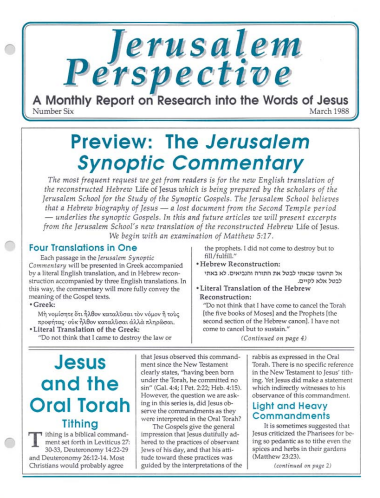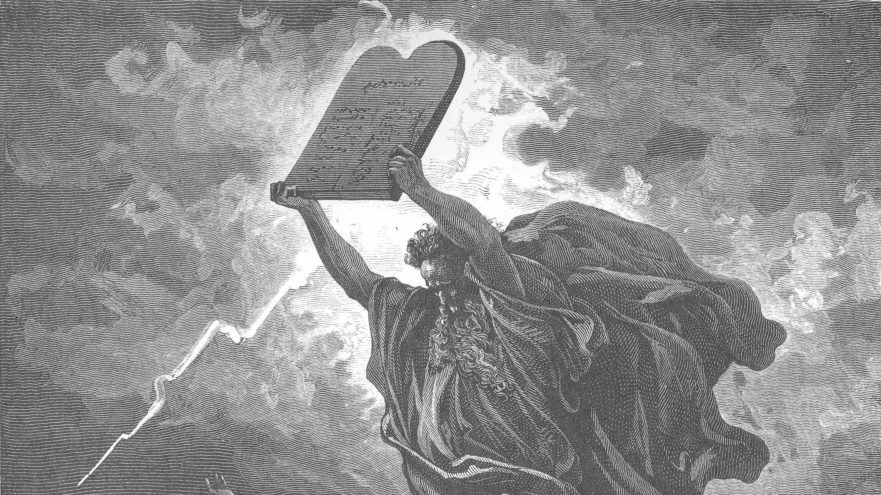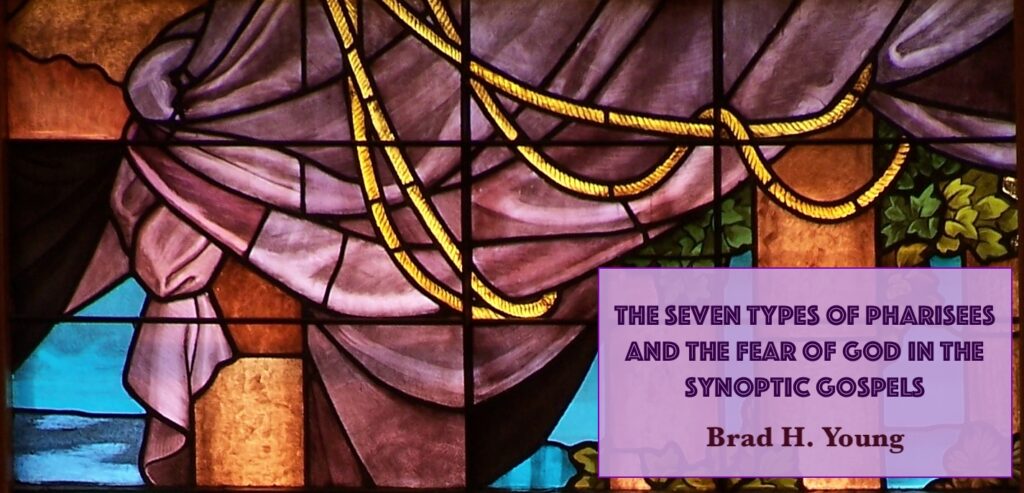Revised: 18-June-2021
One of the most frequent requests JP receives from readers is for a new, English translation of the sayings of Jesus based on an understanding of their Hebraic and Jewish background. Below we offer such a translation of Matt. 5:17-18.
Previous Attempts at Translation
- “Think not that I am come to destroy the law, or the prophets: I am not come to destroy, but to fulfil.” (KJV)
- “Think not that I have come to abolish the law and the prophets; I have come not to abolish them but to fulfil them.” (RSV)
- “Do not think that I have come to abolish the Law or the Prophets; I have not come to abolish them but to fulfill them.” (NIV)
From Literal Greek to Dynamic Hebrew
Greek (Codex Vaticanus):
Μὴ νομίσητε ὅτι ἦλθον καταλῦσαι τὸν νόμον ἢ τοὺς προφήτας οὐκ ἦλθον καταλῦσαι ἀλλὰ πληρῶσαι (me nomisete hoti elthon katalysai ton nomon e tous prophetas ouk elthon katalysai alla plerosai).
Literal Translation of the Greek:
“Do not think that I came to destroy the law or the prophets. I did not come to destroy, but to fill.”
Conjectured Hebrew Reconstruction:
אל תחשבו שבאתי לבטל את התורה ואת הנביאים לא באתי לבטל אלא לקיים (al takhshevu shebati levatel et hatorah ve-et hanevi’im lo bati levatel ela lekayem).
Literal Translation of the Hebrew Reconstruction:
“Do not think that I have come to cancel the Torah [the five books of Moses] and the Prophets [the second section of the Hebrew canon]. I have not come to cancel, but to sustain.”
Idiomatic Translation of the Hebrew Reconstruction:
“Do not think that I have come to weaken the Torah and the Prophets. I have not come to weaken them, but to strengthen them.”
Dynamic Translation of the Hebrew Reconstruction:
“Do not suppose that I have any intention of undermining Scripture by misinterpreting it. My purpose is to establish and maintain the knowledge and observance of God’s Word not undermine it.”
Paid Content
Premium Members and Friends of JP must be logged in to access this content: Login
If you do not have a paid subscription, please consider registering as a Premium Member starting at $10/month (paid monthly) or only $5/month (paid annually): Register
One Time Purchase Rather Than Membership
Rather than purchasing a membership subscription, you may purchase access to this single page for $1.99 USD. To purchase access we strongly encourage users to first register for a free account with JP (Register), which will make the process of accessing your purchase much simpler. Once you have registered you may login and purchase access to this page at this link:
If you enjoyed reading this post, check out these recent JP articles:
- Character Profile: BeelzebulGet acquainted with this mysterious and sinister figure.
- What’s Wrong with Contagious Purity? Debunking the Myth that Jesus Never Became Ritually ImpureThe view that Jesus could not be affected by impurity and that Jesus was able to spread his purity to others is based on faulty assumptions and invalid inferences.
- The Seven Types of Pharisees and the Fear of God in the Synoptic GospelsAncient Jewish sources attest to a debate over which motivation for keeping the commandments—fear or love—was most highly to be esteemed. This debate surfaces, among other places, in the Talmudic discussions of the seven types of Pharisees. These seven types and the debate over love versus fear illuminate important aspects of Jesus’ teaching.
- The Sin Against the Spirit: Matt. 12:31-32; Mark 3:28-29; Luke 12:10Jesus’ saying about the sin against the Holy Spirit belongs to developing Jewish ideas regarding the gradation of sin and punishment. It also reflects his high self-awareness.
- From the Galilee to Jerusalem: Luke as a Source for the Routes of Jewish PilgrimageLuke’s Gospel preserves valuable evidence of pilgrimage routes that would have been utilized by Jewish pilgrims in the Second Temple period.
- Halakha in the GospelsThe Gospels describe Jesus and his followers as keeping halakha to a relatively high extent; they were a group to whom the law was important.






































































































